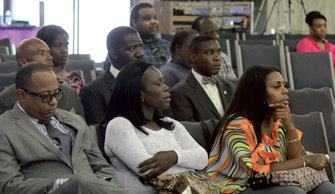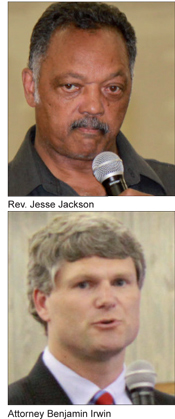Too many questions in handcuff suicide, say attorney, activists seeking truth about death of Chavis Carter
By Charlene Muhammad -National Correspondent- | Last updated: Sep 4, 2012 - 11:53:45 AMWhat's your opinion on this article?

Theresa Carter (far right) and family with members of FOI. Photos: Donald Muhammad
|
As the Jonesboro Police Department in Arkansas released more information, more questions arose about who shot 21-year-old Chavis Carter, said his family and friends. Unfortunately, all of the facts may remain a mystery until a civil or criminal trial, family attorney Benjamin Irwin said.
Police released a dash cam video, of what they called a reenactment of how the alleged suicide could have occurred, and said they interviewed Mr. Carter’s girlfriend. According to police, the girlfriend said the deceased called her saying he had a gun and was afraid.
However, according to Atty. Irwin, the young woman told an entirely different story. Mr. Carter called her twice, the first time from the back of the truck stopped by police and again when he was in back of the squad car.
“He said, ‘Listen, I’m going to jail. I want you to write me every day.’ She was pregnant and he did not want to lose his first family. Here’s a man who was saying he didn’t want to lose his first family, telling his girlfriend to write him every day. The police are making different statements than what were made before,” Atty. Irwin told The Final Call.

|
“At this point and time, I’m not sure how we can truly value whatever comes out of the Jonesboro Police Department and the information that’s provided. There’s entirely too many mistakes, too many omissions, too many coincidences and we want to know the truth of what happened that night,” Atty. Irwin said.
He’s ordered an independent review of the autopsy. While he won’t say it’s impossible for a person double handcuffed to shoot himself as police allege Mr. Carter did, the attorney argues there aren’t enough facts to draw that conclusion.
Perhaps the last person who talked to Mr. Carter alive was told he knew he was going to jail, didn’t want to lose his family, and was very rational and understanding, Atty. Irwin said.
“That’s the best evidence of his state of mind in that point and time that we have to date,” he added.
Some challenges fought during the civil rights movement have never stopped, said Reverend Jesse Jackson, who has gotten involved in the case by meeting with the family and joining marchers.
He linked the cases of Emmett Till, who was brutally murdered by White racists in Mississippi in 1955, and Trayvon Martin, possibly racially profiled, then killed by George Zimmerman in Florida, to the Carter tragedy.
There’s a pattern of violent behavior in America, but there is also growing power to fight it through the media and the vote, Rev. Jackson said during an exclusive interview with The Final Call. “When Emmett Till was killed, there were no Black jurors. You could not have a Southern jury that had Blacks. We couldn’t vote. There were no Black judges,” the civil rights leader noted.
Rev. Jackson led an Aug. 22 prayer vigil at the site of the shooting, then marched two miles with Mr. Carter’s family, friends and supporters to the police department in downtown Jonesboro, Ark., to restate demands for justice and security.
“In the hands of police custody you should be secure, not in jeopardy. What should have been an oasis of security became a pit of hell. He was killed in police custody. No matter how many ways that they try to convince us that he was guilty, he was not Houdini,” Rev. Jackson said.
Four minutes of missing police tape undoubtedly hold answers to many lingering questions and the missing tape evidence suggests a serious cover up is taking place, Rev. Jackson continued. “Before we had the Black coroners, oftentimes when Blacks were killed in jails, it was said it was suicide but it was homicide. So when all of these killings take place in custody, you have a vigorous pursuit to cover up homicide and call it suicide. That’s not new.”
Medical examiners didn’t conduct gun powder tests on Mr. Carter’s hand and would not have been able to determine if one was completed, according to Dr. Stephen Erickson, deputy chief medical examiner of the State Crime Laboratory in Arkansas, which conducted his autopsy. The modern tests basically require an adhesive pad, which is ordered by law enforcement, he said.
Dr. Erickson told The Final Call the gunshot wound itself was not unusual, but the fact that Mr. Carter was handcuffed behind his back was a concern.
So, he said, a pending ruling of suicide was issued until he was satisfied by the police investigation.
Police indicated in an Aug. 22 press release that although Officer Ron Marsh’s video and audio recorders malfunctioned, forcing them to presume when the shot was fired, he “reactivates” his camera shortly after and as ambulances arrive. The police also presume Mr. Carter hid the gun in the back of the police car after he was first patted down, but before he was handcuffed and searched a second time, the report continued.
What people want is the truth, not trumped up story lines that insult their intelligence, said Kareem Ali, a member of the Nation of Islam’s Southaven, Mississippi Study Group. He’s been assisting the Carter family in their quest for answers.
“That’s why we’re on the ground. There are so many people, friends of Chavis, witnesses to some aspect of the police stop on July 28 that have some sense of information about it. There are a lot of answers out there and we’re working to get them,” Mr. Ali said.
A Sept. 2 community rally in Jonesboro is being organized by the Rainbow Push Coalition, Mr. Ali noted.
Mr. Carter’s friends and a growing national community seeking justice is using social media in search of answers and support for justice. More than 4,000 people have liked The Justice for Chavis Carter Facebook page to date. A group page pushing for an investigation into whether police killed Mr. Carter has grown to more than 2,000 members.
Jonesboro Police Department supporters created their own page Aug. 22 and had nearly 5,000 likes at Final Call press time. Another unofficial Support Jonesboro Police Department page created on Aug. 23 had 24 likes at press time.
Supporters of justice for Chavis Carter have used Facebook.com and a petition on Change.org to express condolences and share information about the investigation as it is released. Police supporters have been backing Chief Michael Yates and his officers on the official page. But a line was crossed when supporter statements criminalized Chavis Carter and other Blacks who have been victimized, Mr. Ali said.
“The officers in Jonesboro don’t understand the new kinds of criminals that they are dealing with. They’re not Jonesboro originals. A lot of them came up here from Phillips county and New Orleans after Katrina. They need to wise up,” wrote a Facebook user identified as Sharmon Loggains.
“Whether they come from Philips County or another county in Arkansas, it doesn’t make a difference in regards to how Chavis Carter was a citizen in that community that night and he was under police custody and his life was taken under police custody. It doesn’t matter where he’s from,” Mr. Ali said.
Related news:
Suicide While Handcuffed (FCN, 08-15-2012)
Extrajudicial killings of Blacks are increasing; activists say human rights crisis exists in America (FCN, 07-17-2012)
INSIDE STORIES AND REVIEWS
-
-
About Harriett ... and the Negro Hollywood Road Show
By Rabiah Muhammad, Guest Columnist » Full Story -
Skepticism greets Jay-Z, NFL talk of inspiring change
By Bryan 18X Crawford and Richard B. Muhammad The Final Call Newspaper @TheFinalCall » Full Story -
The painful problem of Black girls and suicide
By Charlene Muhammad -National Correspondent- » Full Story -
Exploitation of Innocence - Report: Perceptions, policies hurting Black girls
By Charlene Muhammad -National Correspondent- » Full Story -
Big Ballin: Big ideas fuel a father’s Big Baller Brand and brash business sense
By Bryan Crawford -Contributing Writer- » Full Story






 Click Here Stay Connected!
Click Here Stay Connected!








